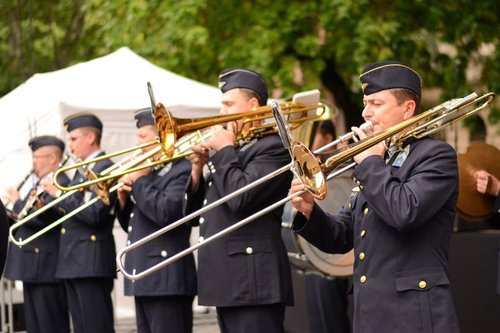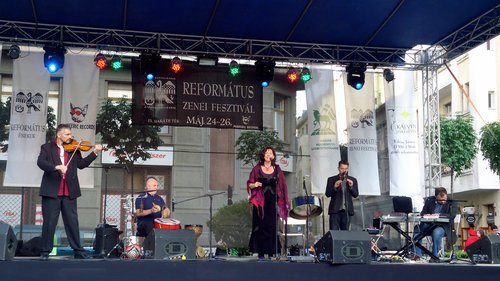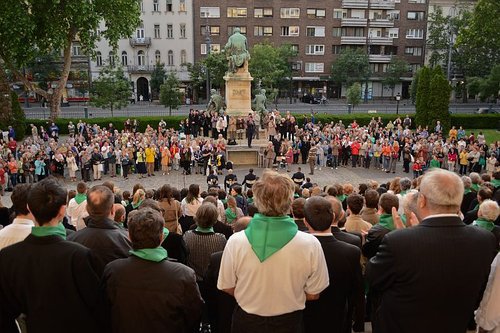This year the Reformed Music Festival was held for the tenth time in Budapest. This three-day program contained musical performances and cultural activities as well as conversations from the seat of the university to the seat of the Parliament.
This year, the morning was yet again filled with noise in the ninth District of Budapest as the 10th Reformed Music Festival commenced on 25 May. The event started with the lead-organizer's speech, who was followed by the mayor of the ninth District, who pointed out that this successful event, which holds a great past, is "more than a cultural event: it's about searching for ourselves and for God Almighty." The Hungarian National Airforce's band provided background music for the speeches, and afterward the audience was entertained by the Berka group's plays of traditional songs of the "csángo" people from Moldva.

After the musical opening of the festival, events continued in the Károli Gáspár Reformed University’s Theology Wing. Later that evening, a lecture was held about the incomparable qualities of the Hungarian language, and for a finish, the lecturer said that “we can only be truly united if we open ourselves. We must cooperate in faith, because it is about the deepness of life and the boundaries after death.”
On Friday afternoon, the participants turned back to the music when Irén Lovász and her band gave a concert at the Bakáts square stage. In spite of the cold weather the audience was big and they had a musical journey through the cultures. There were other activities in the afternoon too, such as András Berecz, famous Hungarian taleteller’s stories for young and old at the University, or the Lónyay Street Highschool’s “Mark experiment” play, or at the Bakáts square stage, Istán Pál “Szalonna” and his band held a musical performance that kept the audience lively. As the final event of the day, a psalmist torch-bearing march was formed and marched singing to the Bakáts temple.

The second day started with a choral meeting, where youths from Hungary and the Carpathian Basin joined together to sing and praise the Lord. The group was diverse; children and elders both received parts. The choir performed various styles as well: old Hungarian songs, psalms and children’s songs were in the choir’s repertoire. The choir leader Vera Kiss said, ”There are several references in the Bible that the Lord was praised with songs and psalms, so this is a form of worship too. I remember the words of Kodály, who said that ‘music is for everyone’, and now we can see how many ways we can praise the Lord through music. Maybe this is the keyword in this festival: everyone serve in the way and style he can, and God takes delight in all of us.” Besides the choir there were other colorful activities, mainly for children as well as other groups that joined in with musical concerts. In addition, there were a lot of shops whose incomes went to charities like the Take My Hand Foundation or the Institute for the Blind.
At the end of the festival, on the stairs of the National Museum, members of the Hungarian National Airforce band played, before being joined by the 500-member festival choir. The two groups united and performed a memorable concert. On Sunday the festival ended with a service, an organ-concert and concerts by the Tompox band and the Emerton-award winning band, After Crying.

While most of the programs were cultural and musical, there was a meeting amongst the Reformed politicians of the Parliament on the last day. Here the politicians shared personnel stories during a panel discussion.
As always, the three festival days were full of activities and we can be sure that the next Reformed Music Festival will be as successful as its predecessors.
Translated and condensed by Márk Troll